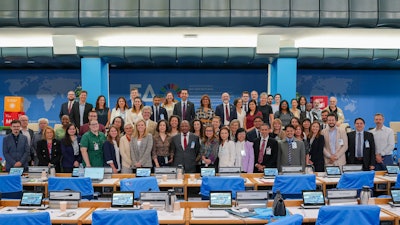
The U.S. Grains Council (USGC) played a pivotal role in sponsoring the Global Bioenergy Partnership’s (GBEP’s) 11th annual Bioenergy Week held in Rome last week. The event, organized by the United Nations (UN) Food and Agriculture Organization, gathered international biofuel stakeholders and policymakers to discuss the efficiency and sustainability practices of biofuel production and explore growth opportunities in Europe and beyond.
USGC Director of Global Ethanol Export Development Mackenzie Boubin and USGC Manager of Ethanol Policy and Sustainability Linda Schmid attended the event, representing the Council and the U.S. ethanol industry.
“This is one of the biggest events on the calendar for the biofuels industry and the Council is proud to have helped make it happen,” Schmid said. “Reducing greenhouse gas emissions is a global problem and it will take a global effort to meet that challenge.”
Prior to the event, Boubin and Schmid met with Ellen Luger, minister counselor for agriculture at the U.S. Mission to the UN, and engaged with staff at the Italian Ministry of the Environment and Energy Security to highlight the benefits of increased ethanol blending rates.
Each day of the conference focused on different opportunities and challenges in the bioenergy sector. The first day emphasized the role of youth in the climate movement, while subsequent days highlighted the intersection of science and public policy, the role of bioenergy in the agricultural supply chain, and biofuels as a sustainable solution for large-scale decarbonization.
The final day centered on bioenergy’s potential in climate change mitigation and global energy access. Boubin delivered a keynote speech on ethanol’s compatibility with existing technologies, underscoring its role in the transition to sustainable energy.
Sustainable bioenergy, as highlighted during the conference, is a crucial component of the bioeconomy. It can be produced from various biomass resources within integrated systems, utilizing energy-efficient and low-emission technologies. Sustainable bioenergy is vital for keeping global warming below 1.5 °C by the end of the century and plays a unique role in just and inclusive energy transitions. It is particularly important for sectors and regions where other decarbonization options are costly or unavailable.
Biomass and its bioenergy derivatives are versatile and storable, capable of replacing fossil energy and complementing variable renewables in transport, power, heat production, industrial processes, and clean cooking. This enhances energy system resilience and contributes to energy security, rural development, job creation, gender equality, and climate change mitigation.
The benefits and trade-offs of bioenergy systems depend on context, scale, and local needs. Good governance is key to maximizing opportunities and minimizing risks, ensuring alignment with Sustainable Development Goals. This includes evidence-based assessments and safeguards for food and energy security, climate justice, biodiversity, land and water rights, and local development priorities.


















